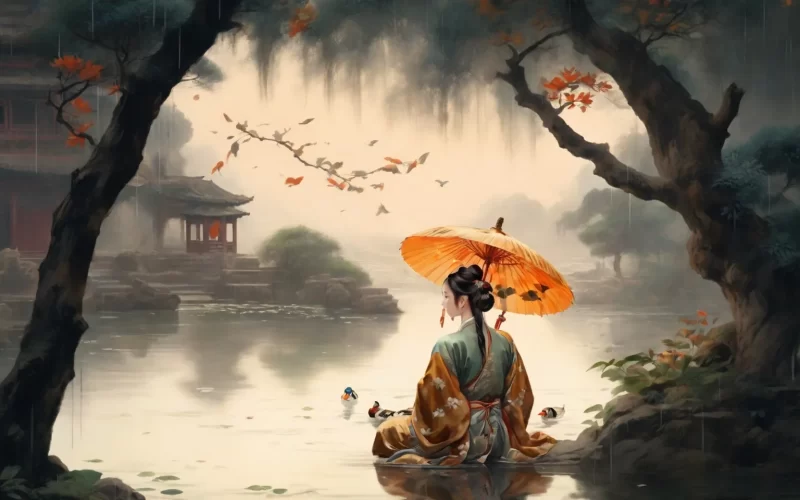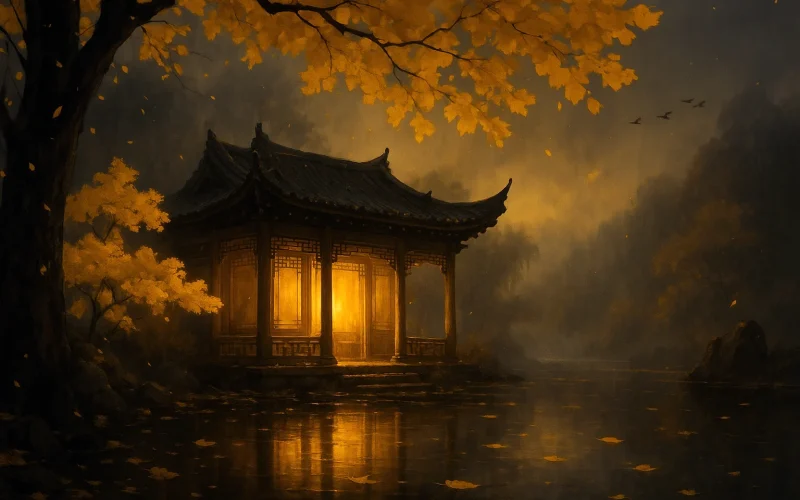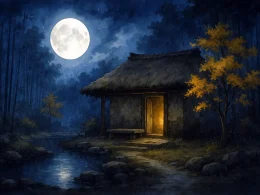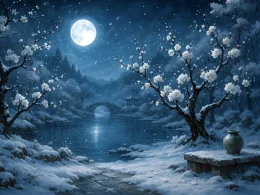A cold light shines on the gathering dew,
As sunset fades beyond the southern mountains;
Trees echo with monkeys on the banks of Lake Dongting,
Where somebody is moving in an orchid-wood boat.
Marsh-lands are swollen wide with the moon,
While torrents are bent to the mountains' will;
And the vanished Queens of the Clouds leave me
Sad with autumn all night long.
Original Poem:
「楚江怀古」
马戴
露气寒光集,微阳下楚丘。
猿啼洞庭树,人在木兰舟。
广泽生明月,苍山夹乱流。
云中君不见,竟夕自悲秋。
Interpretation
Composed in the early Dazhong era of Emperor Xuanzong's reign when Ma Dai was demoted to Longyang County (present-day Hanshou, Hunan) for his forthright remonstrations. Exiled from the north to the Jiangnan region, he wandered the shores of Dongting Lake where the ancient Chu landmarks stirred memories of Qu Yuan and other sages, prompting this triptych of poems - the first presented here.
First Couplet: "露气寒光集,微阳下楚丘。"
Lù qì hán guāng jí, wēi yáng xià chǔ qiū.
Mist gathers, cold light condenses,
Faint sun descends on Chu's eminences.
The opening couplet paints a sparse yet profound scene of late autumn in Chu territory, its chilly palette establishing a melancholic mood. The dwindling sunlight on ancient hills evokes both temporal and spatial desolation.
Second Couplet: "猿啼洞庭树,人在木兰舟。"
Yuán tí dòng tíng shù, rén zài mù lán zhōu.
Gibbons wail through Dongting's trees,
I float alone in magnolia boat on the breeze.
The poetic core merges sound and motion - plaintive primate cries and solitary boating - into an enduring image of exilic loneliness. The magnolia boat, a classical symbol of purity, underscores the poet's unsullied integrity amidst adversity.
Third Couplet: "广泽生明月,苍山夹乱流。"
Guǎng zé shēng míng yuè, cāng shān jiá luàn liú.
Vast waters birth a radiant moon,
Dark cliffs funnel torrents in frenzied tune.
The majestic moonrise over the lake and turbulent currents through mountain gorges create sublime yet unsettling contrasts - nature's grandeur highlighting human insignificance.
Fourth Couplet: "云中君不见,竟夕自悲秋。"
Yún zhōng jūn bú jiàn, jìng xī zì bēi qiū.
The Cloud Lord eludes my sight,
All night I mourn autumn's blight.
The conclusion invokes the Chu deity "Lord of Clouds" (from "Nine Songs") as spiritual absence, transforming landscape into metaphysical lament. The personal "I" emerges explicitly, bridging classical allusion and contemporary sorrow.
Holistic Appreciation
The poem unfolds through layered autumnal imagery - from crepuscular chill to gibbon-haunted shores, then moonlit hydrological drama - before crystallizing in spiritual longing. Its quiet power derives from restrained anguish: Qu Yuan's legacy (symbolized by the elusive deity) underscores the poet's own displacement. The final "autumn mourning" resonates beyond seasonal melancholy to become existential lament, achieving perfect synthesis of scene and sentiment characteristic of late Tang aesthetic refinement.
Artistic Merits
This poem embodies a refined and understated aesthetic, showcasing Ma Dai's signature style of quiet profundity through delicate subtlety. The poet masterfully evokes emotion through landscape, capturing serene yet profound natural scenes with minimal strokes while seamlessly weaving in personal sentiment. His language achieves crystalline precision without sacrificing classical elegance, with particularly inspired imagery choices - the "gibbon's wail," "magnolia-wood boat," "bright moon," and "turbulent currents" - combining to create an exquisitely melancholic and ethereal atmosphere.
Insights
This meditation models how cultural memory consoles personal adversity. By channeling Qu Yuan's exile through Chu landscapes, Ma Dai transforms political failure into aesthetic transcendence. For modern readers, it suggests that engagement with artistic heritage - whether autumnal motifs or ancestral voices - can alchemize disappointment into contemplative grace. The true "nostalgia" here is less about the past than finding timeless companions for present sorrow, reminding us that spiritual kinship across millennia may offer the purest form of solace.
Poem translator
Kiang Kanghu
About the poet

Ma Dai (马戴) (c. 803–876), courtesy name Yuchen (虞臣), was a native of Quyang (present-day southwest of Donghai, Jiangsu) and a distinguished poet of the mid-Tang period. His poetry is characterized by its refreshing clarity and concise elegance, with particular mastery of five-character regulated verse (五律), embodying a unique aesthetic within Tang literary traditions.











